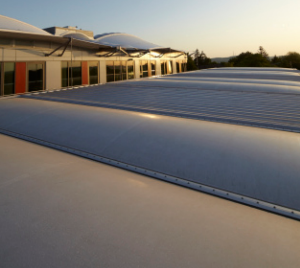 |
| Reviews and Templates for Expression We |
Bavarian Building Coated in ‘Frozen Smoke’ Saves Energy
 Boston-based Cabot, a specialty chemicals company, said its Lumira Aerogel has been used to deliver natural light, provide thermal insulation and cut energy costs in a building designed as an energy efficiency role model in Bavaria, Germany.
Boston-based Cabot, a specialty chemicals company, said its Lumira Aerogel has been used to deliver natural light, provide thermal insulation and cut energy costs in a building designed as an energy efficiency role model in Bavaria, Germany.Sometimes called “frozen smoke,” the Aerogel is hydrophobic, produced as particles, each of which is more than 90 percent air and are contained in a structure that prevents heat transfer, enabling better insulation.
It has been used in the window system installed in the Bavarian Center for Applied Energy Research’s recently opened Energy Efficiency Center. The objective of the project was to use energy-efficient technology in the building construction, in conjunction with an intelligent building design that focused on energy yield. The two-story building is covered by a translucent roof membrane that serves as weather protection as well as an outer layer of the multi-layer structured roof. As part of the inner insulating layer, the building utilizes glass-fiber reinforced polyester panels that are filled with the Lumira aerogel in the ceiling of the rooms.
The translucent ceiling design enables optimal daylight conditions for the offices, and Cabot says its aerogel delivers higher thermal performance and light diffusion when compared to other typically used translucent systems. The project was funded by the German Federal Ministry of Economics and Technology, the Bavarian Ministry of Economics, Transport, Infrastructure and Technology, and industrial partners that provided a variety of innovative building components used to build this project.
Insulating buildings has begun receiving special emphasis now, both from industry and the building code council. In November 2012, Dow Corning said it used vaccuum insulated panels at its research and development center in Seneffe, Belgium, which can reduce energy usage. The energy-efficient insulation product has five to 10 times better thermal resistance than conventional insulation materials, Dow Corning says. Under normal usage, Dow Corning VIP is expected to maintain more than 80 percent of its thermal performance after 30 years, according to the company.
In December, the International Code Council, responsible for energy efficiency standards for buildings in the US, issued an update of the 2012 International Energy Conservation Code. Among other changes, the 2012 code contains more stringent requirements for insulation in new buildings throughout most of the United States in order to improve the energy efficiency of buildings.
|
|
|
|
Copyright 2011 Energy and Technical Services Ltd. All Rights Reserved. Energyts.com |